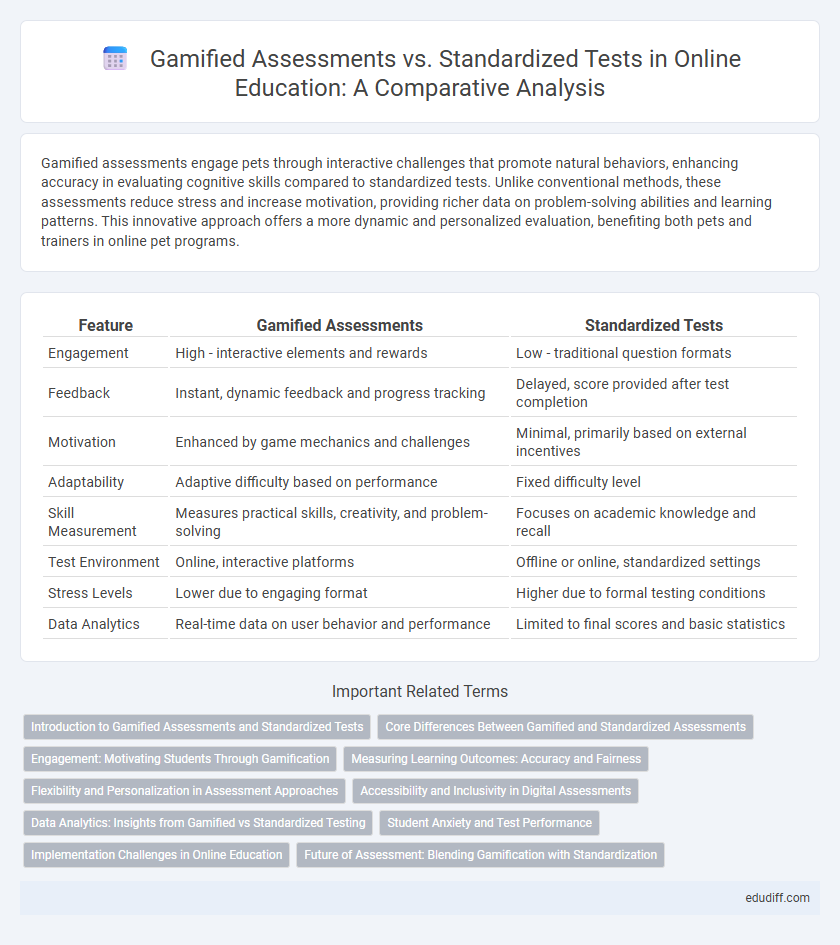Gamified assessments engage pets through interactive challenges that promote natural behaviors, enhancing accuracy in evaluating cognitive skills compared to standardized tests. Unlike conventional methods, these assessments reduce stress and increase motivation, providing richer data on problem-solving abilities and learning patterns. This innovative approach offers a more dynamic and personalized evaluation, benefiting both pets and trainers in online pet programs.
Table of Comparison
| Feature | Gamified Assessments | Standardized Tests |
|---|---|---|
| Engagement | High - interactive elements and rewards | Low - traditional question formats |
| Feedback | Instant, dynamic feedback and progress tracking | Delayed, score provided after test completion |
| Motivation | Enhanced by game mechanics and challenges | Minimal, primarily based on external incentives |
| Adaptability | Adaptive difficulty based on performance | Fixed difficulty level |
| Skill Measurement | Measures practical skills, creativity, and problem-solving | Focuses on academic knowledge and recall |
| Test Environment | Online, interactive platforms | Offline or online, standardized settings |
| Stress Levels | Lower due to engaging format | Higher due to formal testing conditions |
| Data Analytics | Real-time data on user behavior and performance | Limited to final scores and basic statistics |
Introduction to Gamified Assessments and Standardized Tests
Gamified assessments leverage game design elements such as points, levels, and interactive challenges to enhance learner engagement and motivation, contrasting with standardized tests that rely on uniform, structured question formats to objectively measure knowledge or skills. These assessments incorporate adaptive feedback and real-time scoring, providing a dynamic evaluation environment that can better reflect individual performance nuances. Standardized tests maintain consistency and reliability across large populations but often lack the immersive and motivational features present in gamified approaches.
Core Differences Between Gamified and Standardized Assessments
Gamified assessments leverage interactive gameplay elements to engage learners and provide real-time feedback, contrasting with standardized tests that rely on uniform question formats and timed, high-stakes conditions. Gamified assessments emphasize skill application and problem-solving in dynamic scenarios, whereas standardized tests measure knowledge through fixed-response questions designed for broad comparability. These core differences impact motivation levels, test anxiety, and the depth of cognitive skills evaluated in educational and professional settings.
Engagement: Motivating Students Through Gamification
Gamified assessments significantly increase student engagement by incorporating interactive elements such as scoreboards, badges, and levels, which motivate learners through instant feedback and rewards. Unlike standardized tests, which often cause anxiety and disengagement, gamification creates a dynamic learning environment that encourages sustained participation and intrinsic motivation. Research shows gamified learning environments boost retention rates and improve problem-solving skills by making assessments enjoyable and immersive.
Measuring Learning Outcomes: Accuracy and Fairness
Gamified assessments enhance the accuracy of measuring learning outcomes by engaging students in interactive tasks that reflect real-world skills and problem-solving abilities, offering more nuanced data than standardized tests. These assessments reduce bias through adaptive difficulty levels and personalized feedback, fostering a fairer evaluation environment for diverse learning styles and backgrounds. Standardized tests, while consistent in structure, often fail to capture critical thinking and creativity, limiting their fairness and accuracy in assessing true student proficiency.
Flexibility and Personalization in Assessment Approaches
Gamified assessments offer greater flexibility by adapting to individual learning paces and styles, unlike standardized tests that apply uniform criteria to all participants. Personalization is enhanced in gamified formats through customized feedback and interactive elements tailored to the test-taker's performance and preferences. These dynamic approaches lead to more engaging assessments that better reflect a learner's competencies than traditional standardized testing methods.
Accessibility and Inclusivity in Digital Assessments
Gamified assessments enhance accessibility by integrating interactive and adaptive elements that accommodate diverse learning styles and cognitive abilities, fostering inclusivity for students with disabilities or language barriers. These digital tools often offer customizable interfaces and real-time feedback, ensuring equitable participation compared to rigid standardized tests. The engaging nature of gamified formats reduces test anxiety, promoting motivation and sustained attention across varied learner demographics.
Data Analytics: Insights from Gamified vs Standardized Testing
Data analytics from gamified assessments reveal higher engagement rates and more nuanced performance metrics compared to standardized tests, enabling deeper insights into learner behavior. Gamified testing captures real-time data on problem-solving strategies and emotional responses, offering a comprehensive view of cognitive skills beyond right or wrong answers. Standardized tests primarily provide score-based outcomes, limiting the scope of predictive analytics and personalized feedback.
Student Anxiety and Test Performance
Gamified assessments reduce student anxiety by incorporating interactive elements and real-time feedback, creating a more engaging testing environment compared to traditional standardized tests. Lower anxiety levels correlate with improved test performance, as students demonstrate better concentration and problem-solving skills during gamified evaluations. Research indicates that gamified assessments can lead to higher retention rates and more accurate measures of student knowledge and abilities.
Implementation Challenges in Online Education
Gamified assessments often face implementation challenges such as ensuring platform compatibility, maintaining data security, and providing equitable access across diverse student populations in online education. Standardized tests in online settings contend with issues like preventing academic dishonesty, technical disruptions, and scalability to large test-taker cohorts. Both assessment types require robust technological infrastructure and clear instructional design to achieve effective, reliable evaluation in virtual learning environments.
Future of Assessment: Blending Gamification with Standardization
Gamified assessments enhance student engagement and motivation by integrating interactive elements and real-time feedback, contrasting with the rigid format of standardized tests. Blending gamification with traditional assessment frameworks promises adaptive learning experiences that accurately measure skills while maintaining reliability and validity. This hybrid approach leverages data analytics to personalize evaluation, paving the way for more dynamic and inclusive future assessment methods.
Gamified assessments vs Standardized tests Infographic

 edudiff.com
edudiff.com